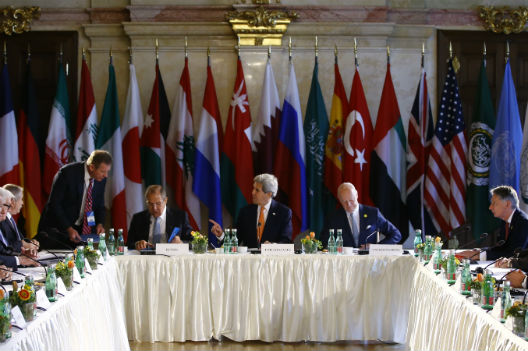 The situation in Syria is far more complex than what people have been describing. Unfortunately, the people who are responsible for understanding Syria strongly disagree with each other about who the prime actors are, who influences the country, the influence of actors relative to each other, and the overall state of the country. The current information situation is very confused.
The situation in Syria is far more complex than what people have been describing. Unfortunately, the people who are responsible for understanding Syria strongly disagree with each other about who the prime actors are, who influences the country, the influence of actors relative to each other, and the overall state of the country. The current information situation is very confused.
This confused information system and the inherent lack of shared information is a massive concern for anyone who wants to help Syria—whether a Syrian activist, the Syrian government, a wealthy political activist, a neighboring country, the United States, or the European Union. Anyone working on Syria must answer a series of important questions, “Whom should we support? From whom should we seek support? From whom should we accept support?” If you are not sure of the answers to these questions, then you are guessing—with not only a significant amount of financial aid but also with the future of the Syrian people and the region as a whole hanging in the balance.
When the civil war ends, there will be a rush to rebuild Syria and impose or negotiate new economic, political, and social agreements. If there is a lack of shared understanding and confusing information still persists in Syria, our best efforts are likely to resemble the efforts of the United States and the international community to rebuild Iraq and Afghanistan.
The solution is to generate a shared political understanding among those who will shape and enforce agreements and a new social contract in post-conflict Syria. For a shared political understanding to be possible, prime actors in Syria and the region must understand each other and the country in its entirety, through rounds of ongoing public conversation about essential political information.
Some of the questions that need to be asked of these prime actors:
- Who are the prime local, regional, and international actors in Syria?
- Who is influential?
- What are their motivations?
- Why are they important?
- How are they influential?
- Are they helping Syria to build its national capacity to adapt and develop, or are they degrading the country?
- What is the capacity of Syria to adapt to threats? What threatens Syria?
These are precisely some of the questions that Sovereignty First, a (benefit) B-LLC based in Washington DC using the Sovereignty First Framework, asked of 49 local, regional, and international prime actors. Formal or informal representatives of 10 of those prime actors worked with us. These included:
- Egypt
- The European Union
- Local Councils
- Russia
- The National Coalition of Syrian Revolutionary and Opposition Forces
- The Syrian American Medical Society
- The Syrian National Coalition
- The Syrian Government
- Turkey
- The Union of Medical Care and Relief Organizations
We asked them to identify and assess each other and to assess the country, thereby generating a unique peer-assessment-based actor and country profile. In order to show commitment to the shared knowledge revolution, Sovereignty First has made the full report of the first round of interviews in Syria public and it can be viewed here.
The Sovereignty First Framework combines on-the-ground shuttle diplomacy with the transparent collection and sharing of perspectives from those with the power to shape and enforce economic, political, and social agreements in post-conflict Syria.
Over many rounds of interviews with prime actors, reports, and media campaigns, shared understanding will gradually replace the current state of confusion. After five or ten rounds of more than one hundred prime actors participating anonymously, we can finally move toward a shared understanding of Syria’s capacity to adapt and develop.
With shared understanding instead of confusion, all prime actors will be able to predict and coordinate better. This shared political understanding will empower competent experts and analysts while weakening biased or less competent analysts. The transparency that comes as a result of this framework will help nation-builders gain legitimacy and succeed in their initiatives, while dampening the effects of those who wish to degrade the nation’s capabilities. In the next post, we will discuss some of the specific things we learned from our first round in Syria.
Eric Wolterstorff led the development of the Sovereignty First Framework.
With partners in Syria, Iraq, and Jordan, his firm is seeking funding to set up and maintain frameworks in all three countries.
Image: PHOTO: Russian Foreign Minister Sergei Lavrov (L), U.S. Secretary of State John Kerry (C) and United Nations special envoy on Syria Staffan de Mistura (R) attend the ministerial meeting on Syria in Vienna, Austria, May 17, 2016. REUTERS/Leonhard Foeger
